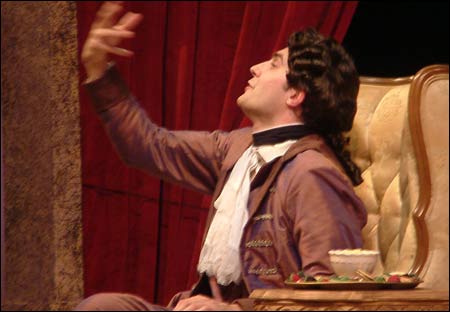It is notoriously difficult to portray genius, especially when not doing so at descriptive length upon the page. Film and theater have the advantage of being able to show rather than tell, but that comes with its own problem — the profoundest reasons are deep beneath the surface.

SINGLE-MINDED: Dujardin as Salieri.
|
So playwright Peter Shaffer succeeded with his brilliantly realized Amadeus by approaching the subject obliquely, showing less of what musical genius is than the bitterness and diabolical compensation that its absence can lead to. The current Providence College production (through November 5), directed by John Garrity, does a fine job of illuminating the psychological nooks and crannies of Shaffer’s exquisitely crafted double portrait.
The play begins with Vienna aflutter over a rumor that composer Antonio Salieri, lifelong rival to the late Wolfgang Amadeus Mozart, has been muttering about being responsible for his death. The aged Salieri, near the end of a dizzyingly successful career, addresses us as ghosts of the future. He confesses his responsibility for the poverty and premature death, at 34, of a man he can't help but admit was the greatest composer of all time, predecessors Bach and Beethoven notwithstanding.
The play is a grand tour of their history together, in which Mozart thought him to be a supporter and even protector at the Austrian court. (The play is a fiction, not a history lesson. Although there were rumors that Salieri had plotted against the composer and even poisoned him, since Mozart’s son later took lessons from him, there couldn’t have been much contemporary credibility about the stories.)
ADVERTISEMENT
 |
The high production values at Angell Blackfriars Theatre do much to keep us in the 18th-century milieu as well as in the proper mood. The scenic design by Carl F. Gudenius has an illuminated circle hovering above the stage, somewhat like a baroque dome but more like a halo. A trio of abutting circles on the faux marble floor echo the motif of Salieri repeating his paranoid fears as he tells his story. Costume design by David Costa-Cabral, full of lace and shiny satin, re-creates the period down to the buckled footwear. Lighting design is by Katherine C. Abernathy and sound design by Chris Warren.
Salieri (Jeffrey Dujardin) is the royal composer in the court of Emperor Joseph II (Brian McCormack) when the young Mozart arrives in Vienna. The 25-year-old man is finally free of the domination of his musician father, who had his son performing at courts throughout Europe since he was a child — the prodigy wrote a symphony at age 8.
Fittingly, Salieri first comes across Mozart (Keith R. Martin) when the potty-mouth adult boy is frisking about in a supposedly empty room with his fiancée Constanze (Caitlin Elizabeth Doyle). Martin creates a wonderful presence, playing Mozart as gigglingly joyful as Tom Hulce did in the 1984 film version but also able to handle the inevitable anguish when Mozart knows he’s approaching his demise. Doyle is a good match, spirited and a convincingly playful helpmate.
Dujardin’s Salieri remains human enough to stay sympathetic and yet is a single-minded creature, never leaving the obsession that the villain now and then shakes like a terrier with a rat. Although Salieri confesses to “a lack of fire,” the playwright cleverly has him muster formidable passion midway through, declaring war not so much on Mozart but on God. So the vendetta is both literal and metaphorical. “Amadeus” means loved by God, so Shaffer has raised the stakes from a petty, selfish feud to a battle of Miltonian proportions. Also, in this way the second-rate composer can breast-beat about his miserable mediocrity much more believably than we’d accept, just as he can pour on the praise over occasional passages of beatific music that we hear. The genius of Mozart becomes a theological affront to Salieri’s sense of heavenly fair play.
McCormack hits just the right notes as the amiable but foolish emperor, who doesn’t exactly have a tin ear but is as impatient as an iTunes listener to the significance of Mozart’s best works. That sort of insensitivity combined with court politics, and the deference that even the Emperor must pay to court tastemakers, goes far to explain how Mozart could die out of fashion and out of money.
Amadeus is one of those rare ostensibly biographical plays that is expanded rather than restricted by the facts at hand. As this engaging Providence College production shows us, when you’re dealing with matters as evocative as music and creativity, actual events are simply starting points.